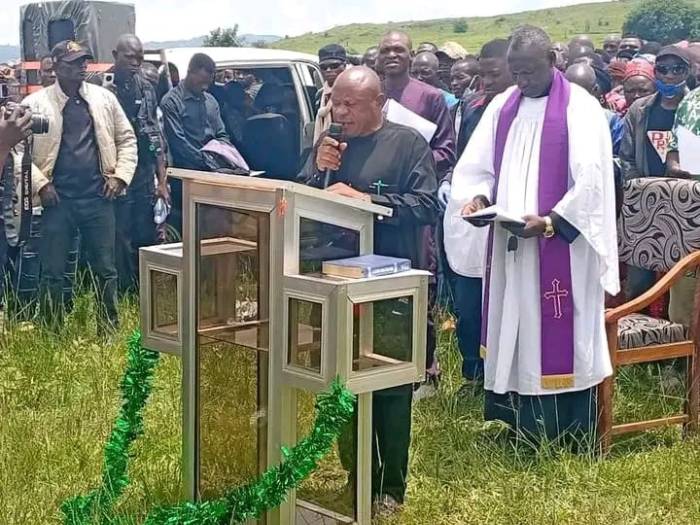27 Christians Buried Following Fulani Militia Attacks in Nigeria’s Plateau State

7/28/2025 Nigeria (International Christian Concern) — The bodies of 27 people killed during an overnight assault on a Christian farming community in central Nigeria’s Plateau state were laid to rest on July 25 during a mass burial attended by thousands of mourners. The victims, among them women and children, were buried in shallow graves behind the local church in the village of Bindi in the Tahoss district.
The attack occurred on July 15, when gunmen stormed the village in the early hours of the morning. Survivors identified the attackers as Fulani militias, a group often blamed for repeated raids on Christian communities across Nigeria’s Middle Belt. The dead had been taken to the Jos University Teaching Hospital mortuary after the attack and were transported back to Bindi for burial three days later.
Mourners gathered in silence, many weeping as they filed past the rows of graves. Wooden crosses, some with names written in chalk, marked the burial site. Security personnel were visible in the area during the ceremony, but several residents questioned their presence, saying it was too late to prevent the violence.
“We are burying our brothers and sisters with heavy hearts,” said Rev. Amos Gyang, who led the funeral prayers. “These were innocent people killed in their sleep.”
Religious leaders, youth groups, and civil society organizations attended the service, demanding greater protection for vulnerable rural populations.
The attack in Bindi was part of a string of violent incidents that week in Plateau state. Just a day earlier, on July 14, 32 people were killed in nearby Jebu village under similar circumstances. And on July 24, at least 14 traders returning from a local market were killed when their vehicle was ambushed in Chirang village in the Mangor district.
According to local accounts, the attackers blocked the road and opened fire on the vehicle without warning. Witnesses reported that some victims were hacked to death with machetes. The victims included women and children returning from Bokkos market.
In the aftermath, local youth leader D’Young Mangut, who helped retrieve the bodies, said the region had seen an unprecedented wave of violence.
“People are being killed like chickens, and nothing is being done,” he said.
One grieving relative told reporters, “We are tired of condolences and statements. What we need is real security, not sympathy.” Local leaders have expressed growing frustration over what they see as repeated failures by authorities to prevent attacks, despite military deployments in the region.
A Mobile Police (MOPOL) officer was also killed during the July 24 attacks. Reports indicate that the IG Tactical team stationed in Bokkos attempted to respond to the ambush but were met with heavy gunfire. Two officers were injured and transported to Jos University Teaching Hospital for treatment. In a separate incident the same day, another officer was shot at a checkpoint along the Richa Road in Bokkos.
The Nigerian Army and Plateau state government have yet to issue detailed statements on the July 24 attacks as of press time. Governor Caleb Mutfwang previously described similar incidents as genocidal, but residents said such declarations have not translated into effective security.
Displacement across the region is rising. Humanitarian workers estimate that more than 3,000 people have been forced from their homes in Riyom, Bokkos, and surrounding areas in recent months. Many are now taking refuge in churches, schools, and unfinished buildings. Local farmlands are abandoned, disrupting food production and deepening fears of a worsening food crisis.
Church leaders in Bokkos have declared days of mourning, while schools and markets have remained closed in response to the killings. Religious and community leaders continue to call for accountability, while insisting that those responsible be brought to justice.
Mass burials are now a recurring event in Plateau. Residents said they are overwhelmed by grief and fear, uncertain of when or where the next attack might happen. The frequency of the violence and the lack of sustained security response have led to widespread calls for a change in Nigeria’s approach to internal security, especially in rural Christian communities.
The attacks in Bindi, Jebu, and Bokkos are part of a pattern that has emerged in recent years across the Middle Belt, where longstanding tensions over land, religion, and identity have often erupted into violence. In many cases, victims are members of Christian farming communities attacked overnight or while traveling between villages and markets.
Though the federal government continues to maintain that it is doing everything possible to protect citizens, many residents say they no longer feel safe. Public outrage continues to grow, fueled by each new report of killings, displacement, and unanswered cries for help.
Security analysts and civil society groups are urging the Nigerian government to increase intelligence gathering, improve rapid response capacity in rural areas, and invest in community-based policing. Meanwhile, the people most affected are calling for one thing above all: the right to live without fear of being killed.
As of late July, the month’s attacks alone — across Bindi, Jebu, and Bokkos — have claimed over 70 lives, making it one of the deadliest weeks in Plateau this year.
To read more news stories, visit the ICC Newsroom. For interviews, please email [email protected]. To support ICC’s work around the world, please give to our Where Most Needed Fund.
